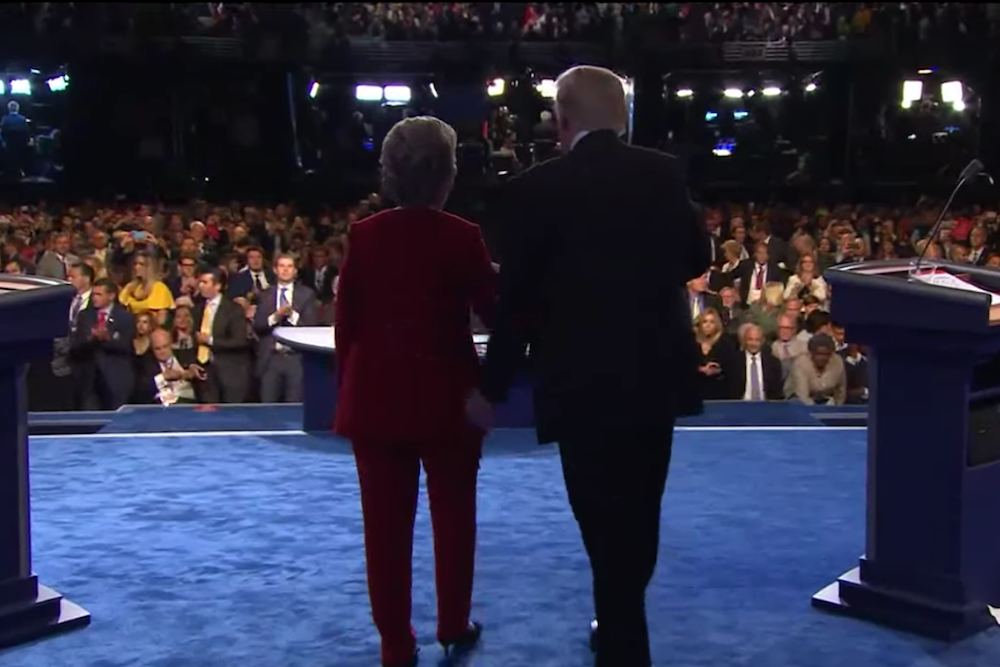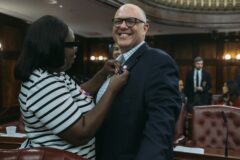We pulled up YouTube at about 8:30 last night at my apartment, half an hour before the first presidential debate between Hillary Clinton and Donald Trump was scheduled to begin. By happenstance or divine intervention, one of the homepage’s free-associative carousels of recommended videos contained a link to a short satirical song called “This Is America,” by the musician Father John Misty. “This is America,” he sang as my companion and I watched the clock. “We’ve got some time to kill, and we need a thrill, so we die doing the dumbest of shit, here we go.”
What followed was a roughly 100-minute catalog of American paranoia and excess. The candidates stood there on their podiums, height-adjusted so that neither appeared taller than the other on television, and reminded us that we are being attacked on all sides. A melting planet. Trigger-happy police. Superior airports in China and Dubai, centrifuges whirling away in Iran. ISIS on the internet. “Even one murder is too many,” Hillary said at one point. “True,” Donald chimed in.
All through the night, Trump’s arguments and prognostications were peppered with these moments of accidental zen. “Look, I’m a true believer in all forms of energy,” he’d admonished earlier in the evening. He was talking in a strictly physical sense, I think—clean energy, diesel energy, and so on—but in that moment, he might have been a monk, or a peddler of high-end juice cleanses.
A few minutes later, Lester Holt, the moderator, asked Trump to defend his proposal to cut taxes for the wealthy at a time of unprecedented income inequality. “Well, I’m really calling for major jobs, because the wealthy are going to create tremendous jobs. They’re going to do a tremendous job,” he answered, inflecting “job” with a new and subtle idiocy on each repetition, like John Coltrane playing the kazoo. Faced with his radiant aphorisms, Clinton countered the best way she knows how: with hard facts and a catchphrase, Dangerous Donald 2.0. “I call it trumped-up trickle down,” she said, flashing a satisfied smile.
If “winning” this debate were defined so simply as “making assertions that are verifiably true,” or “being prepared,” or “proposing solutions that have a real shot at fixing the problems at which they are aimed,” Clinton could be said to have won in a landslide. But if, as the harlots on cable news reminded us, winning is about “moments” and “intangibles” and “looking presidential,” then the verdict is anyone’s guess. Ultimately, the terms of debate are up to the voters. And how do you convince a guy who’s going Trump because he’s terrified of women and minorities that the woman candidate schooled him? If someone’s been sold on the idea that the media will publish untruths if it means stopping the Trump Train, how does that same media show them that their hero is the one who’s really lying through his teeth?
Halfway through the debate, Holt asked the candidates a question about race in America. All parties assumed, and not without reason, that this was really a question about violence and policing. These subjects are so intimately tied in our country that their association is a given, and the coziness with which they occupy a single debate topic needn’t be remarked upon or explained. The quiet tragedy of last night’s race question may be a only minor symptom of the disease of racism in America, but the sober professionalism with which moderator and candidates attempted to handle it made it the most poignant and jarring moment of the night. In Tulsa and Charlotte, the families of Terence Crutcher and Keith Scott are still mourning.
On one side, there was Clinton, the former Goldwater girl gone good, offering reasonable policy-based answers to a problem that sometimes seems insurmountable. We need to retrain police officers to use force only when necessary, she said, and restore trust between them and the communities they patrol. We need to end the use of private prisons in state systems. We need to eliminate mandatory minimums, and get guns off the streets.
Her overture was enough to convince a die-hard supporter of criminal justice reform. Then, she ended it with a ringing endorsement of the patently unproductive, borderline racist idea that people on the “no fly” terror watch list shouldn’t be allowed to purchase weapons. In 2014, forty percent of the 680,000 people on federal government watchlists had “no recognized terrorist group affiliation,” and a disproportionate number of them were Arab-Americans. Even if you want to ban guns outright, this isn’t the way to do it.
https://youtube.com/watch?v=84jlmA__SdU
Trump, Islamophobe that he is, agreed with Hillary’s point about the watchlist, though he took issue with just about everything else she said. He was the bloodthirsty warlord, the disciple of Rudy Giuliani, professing that our nation might heal if only we had more cops, more Law and Order. Though they went unmentioned, Trump’s speech was haunted by the specter of the Central Park Five, a group of black and Latino teenaged boys who were arrested and jailed in 1989 for the brutal rape of a white jogger named Trisha Meili. Two weeks after the attack, when Meili was still in a coma and Trump was still just a publicity-hungry real estate broker, he purchased a full-page in the New York Daily News calling for the execution of the alleged perpetrators. “BRING BACK THE DEATH PENALTY, BRING BACK OUR POLICE!” read the headline.
In 2002, after some of the Five had spent over a decade in prison, they were exonerated when another man confessed to the crime and was convicted with DNA evidence. But if it were up to the Republican candidate, all five of them would be dead. Yusef Salaam, who was fifteen years old when he was accused of raping Meili, told the Guardian recently that Trump “was the fire starter … Common citizens were being manipulated and swayed into believing that we were guilty.” Law and order have a dark side. Donald Trump should know.
His answers last night also revealed that he’s willing to abandon his principles if it means scoring a few points on his opponent. Clinton’s biggest weakness on the issues of race and policing is her full-throated support for the so-called ’94 crime bill two decades ago, a law that her husband signed when he was in office, which created or exacerbated many of the problems with the criminal justice system that she now rails against. Famously, Hillary used the term “superpredators,” meaning criminal youths with “no conscience, no empathy,” in a 1996 speech about the law. Trump seized on this line, using it to question Clinton’s bona fides, never mind that the Hillary of 1996 was exactly the same kind of anti-crime zealot as the Trump of 2016.
By the time Trump claimed that he will bridge our nation’s racial divide by using stop-and-frisk, I was ready for a drink. “Stop-and-frisk was ruled unconstitutional in New York, because it largely singled out black and Hispanic young men,” Holt replied. “No! You’re wrong,” Trump interrupted. Holt was right. Trump was lying, again.
Poor Lester Holt. A reasonable man with an unreasonable task. Early in the debate, he attempted to move to a new topic, and the candidates steamrolled him so that they could continue arguing about who has the better website. When I first started watching, I was tuned in to a pirate stream of CNN, with its bloviating correspondents and psychedelic onscreen graphics. That feed was pulled down on a copyright complaint minutes before the debate was to begin, and I switched to the Washington Post for some more dignified coverage. I tuned in just in time to hear Holt struggling with his earpiece. “Not hearing you,” he said, sitting alone at his desk, before the candidates entered. “Not hearing you. You’re broken up.” A technician walked out to assist him, and after a minute or two, Holt affirmed that the glitch had been fixed. Poor Lester Holt. Watching him in these preliminary moments the following morning, he looks tiny and unsure. Just like America, he has no idea of the chaos that’s coming next.





